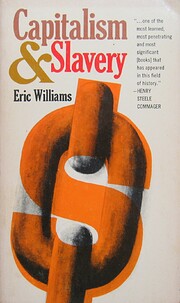

Auf ein Miniaturbild klicken, um zu Google Books zu gelangen.
|
Lädt ... Capitalism and Slaveryvon Eric Williams
 Keine aktuelle Diskussion zu diesem Buch.   ) )Eric Williams was prime minister of Trinidad and Tobago from 1961 until his death in 1981. Before that, he was a professor of political and social science at Howard University. His book, Capitalism and Slavery was published in 1944 and, as per Colin Palmer's introduction to the 1994 UNC Press edition I read, met with mixed reactions due to the new perspective it provided. As a West Indian, Williams' focus was slavery in the British Empire, and especially in the West Indies sugar colonies. General belief had it that the abolition of slavery in the Empire had been driven primarily by humanitarian movements in England. Williams' thesis was that the proliferation of slavery was driven by the mercantile system, in which British colonies could only trade with the mother country, and protective tariffs made it prohibitively expensive for British companies to buy raw materials from anyone but those colonies. However, the capital accumulated in England via this system became substantial enough to fund inventions like the steam engine that eventually rendered this protective system obsolete, creating a clamor for free trade instead. Once this happened, the West Indian sugar plantations, were doomed. Sources of raw material, such as India, where slavery was not in widespread, or at least universal, practice, made it impossible for the slave colonies to compete. The industrialists in England no longer wanted to pay high tariffs to protect the trade of slave colonies. They no longer wanted to build ships for slavers because, Williams shows that the slave trade was a high risk proposition for ship owners and for sailors, whose death rate on slave ship duty was significantly higher than on other sort of merchant duty. (Williams never expressly says why that was.) Also, once the American colonies had won their independence, new markets were opened up for British importers. Finally, slave uprisings in the West Indies, in one colony or another, were relatively frequent, adding to the sense of unease and the reluctance of the English public to continue to countenance slavery. It's not that Williams didn't think the abolitionists were important. He devotes an entire chapter to their work. But the theme of his book was that they were not the primary drivers of slavery's end in the British Empire. Slavery ended, said Williams, when it was no longer economically viable. Members of Parliament who were supporters of slavery in one decade attacked the slave trade in the next. But when it came to the economic prosperity of the Empire, most British lawmakers and influential citizens were willing and able to shrug off slavery's injustices and horrors. Humanitarianism simply wasn't their brief. Williams does a great job of illustrating the ways in which, during British slavery's heyday, the entire economy of the Empire was tied up in the practice. Slaves had to bought and transported (slavers and ship builders), they had to be clothed (cotton and wool manufacturers) and they had to be restrained (miners and forgers of handcuffs and other such devices). Food had to be imported, as well, because most of the islands, such as Barbados, crammed sugar cane into every arable acre. The ideas behind the book are fascinating. Unfortunately, as a historian, Williams could not ask his readers to take his word regarding his research. He had to provide details about the rise and fall of mercantilism and slavery and then the free trade movement. There are a lot of such details, numbers regarding exports and imports of a wide range of colonies and industries, etc. One can understand Williams' need to include them, especially as he was proposing a new theory of events, but they can be slow in the reading. Again, this book was first published in 1944. Palmer, in his introduction, tells us that subsequent research has in most cases confirmed Williams' thesis, but in some cases has contradicted some of Williams' ideas. He doesn't specify, however. So we read this book with the thought that, while Williams was creating a new and mostly valid framework for understanding the history he's dealing with, not every detail held up to the research done over the next half century. Zeige 2 von 2 keine Rezensionen | Rezension hinzufügen
Bemerkenswerte Listen
Slavery helped finance the Industrial Revolution in England. Plantation owners, shipbuilders, and merchants connected with the slave trade accumulated vast fortunes that established banks and heavy industry in Europe and expanded the reach of capitalism worldwide. Eric Williams advanced these powerful ideas in Capitalism and Slavery, published in 1944. Years ahead of its time, his profound critique became the foundation for studies of imperialism and economic development. Binding an economic view of history with strong moral argument, Williams's study of the role of slavery in financing the Industrial Revolution refuted traditional ideas of economic and moral progress and firmly established the centrality of the African slave trade in European economic development. He also showed that mature industrial capitalism in turn helped destroy the slave system. Establishing the exploitation of commercial capitalism and its link to racial attitudes, Williams employed a historicist vision that set the tone for future studies. William A. Darity Jr.'s new foreword highlights Williams's insights for a new generation of readers, and Colin Palmer's introduction assesses the lasting impact of Williams's groundbreaking work and analyzes the heated scholarly debates it generated when it first appeared. Keine Bibliotheksbeschreibungen gefunden. |
Aktuelle DiskussionenKeineBeliebte Umschlagbilder
 Google Books — Lädt ... Google Books — Lädt ...GenresMelvil Decimal System (DDC)338.0941Social sciences Economics Production Biography And History Europe British Isles -- Ireland & ScotlandKlassifikation der Library of Congress [LCC] (USA)BewertungDurchschnitt: (3.98) (3.98)
Bist das du?Werde ein LibraryThing-Autor. |
||||||||||||||||||||||||||||||||||||||||||||||||||||||||||||||||||||||||||||||||||||||||||||||||||||||||||||||||||||||||||